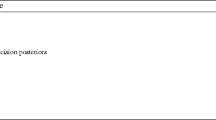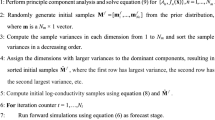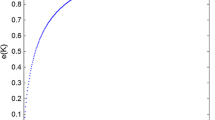Abstract
In this study, we explore an efficient stochastic approach for uncertainty quantification of unconfined groundwater flow in heterogeneous media, where a sparse polynomial chaos expansion (PCE) surrogate model is constructed with the aid of the feature selection method. The feature selection method is introduced to construct a sparse PCE surrogate model with a reduced number of basis functions, which is accomplished by the least absolute shrinkage and selection operator-modified least angle regression and cross-validation. The training samples are enriched sequentially with the quasi-optimal samples until the results are satisfactory. In this study, we test the performance of the sparse PCE method for unconfined flow with the presence of random hydraulic conductivity and recharge, as well as pumping well. Numerical experiments reveal that, even with large spatial variability and high random dimensionality, the sparse PCE approach is able to accurately estimate the flow statistics with greatly reduced computational efforts compared to Monte Carlo simulations.









Similar content being viewed by others
References
Babuška, I., Nobile, F., Tempone, R.: A stochastic collocation method for elliptic partial differential equations with random input data. SIAM J. Numer. Anal. 45(3), 1005–1034 (2007)
Ballio, F., Guadagnini, A.: Convergence assessment of numerical Monte Carlo simulations in groundwater hydrology. Water Resour Res 40(4), W04603-1 (2004)
Bear, J.: Dynamics of Fluids in Porous Media. Courier Corporation, New York (1972)
Blatman, G., Sudret, B.: An adaptive algorithm to build up sparse polynomial chaos expansions for stochastic finite element analysis. Probab. Eng. Mech. 25(2), 183–197 (2010)
Blatman, G., Sudret, B.: Adaptive sparse polynomial chaos expansion based on least angle regression. J. Comput. Phys. 230(6), 2345–2367 (2011)
Chang, H., Zhang, D.: A comparative study of stochastic collocation methods for flow in spatially correlated random fields. Commun. Comput. Phys. 6(3), 509 (2009)
Dai, C., Li, H., Zhang, D.: Efficient and accurate global sensitivity analysis for reservoir simulations by use of probabilistic collocation method. SPE J. 19(04), 621–635 (2014)
Dash, M., Liu, H.: Feature selection for classification. Intell. Data Anal 1(3), 131–156 (1997)
Doostan, A., Owhadi, H.: A non-adapted sparse approximation of PDEs with stochastic inputs. J. Comput. Phys. 230(8), 3015–3034 (2011)
Efron, B., Hastie, T., Johnstone, I., Tibshirani, R.: Least angle regression. Ann. Stat. 32(2), 407–499 (2004)
Elsheikh, A.H., Hoteit, I., Wheeler, M.F.: Efficient Bayesian inference of subsurface flow models using nested sampling and sparse polynomial chaos surrogates. Comput. Methods Appl. Mech. Eng. 269, 515–537 (2014)
Fajraoui, N., Mara, T.A., Younes, A., Bouhlila, R.: Reactive transport parameter estimation and global sensitivity analysis using sparse polynomial chaos expansion. Water, Air, Soil Pollut. 223(7), 4183–4197 (2012)
Fajraoui, N., Marelli, S., Sudret, B.: On optimal experimental designs for sparse polynomial chaos expansions. arXiv preprint arXiv:1703.05312 (2017)
Ghanem, R.: Scales of fluctuation and the propagation of uncertainty in random porous media. Water Resour. Res. 34(9), 2123–2136 (1998)
Ghanem, R.G., Spanos, P.D.: Stochastic Finite Elements: A Spectral Approach. Courier Corporation, New York (2003)
Golub, G.H., Heath, M., Wahba, G.: Generalized cross-validation as a method for choosing a good ridge parameter. Technometrics 21(2), 215–223 (1979)
Guyon, I., Elisseeff, A.: An introduction to variable and feature selection. J. Mach. Learn. Res. 3(Mar), 1157–1182 (2003)
Hampton, J., Doostan, A.: Compressive sampling of polynomial chaos expansions: convergence analysis and sampling strategies. J. Comput. Phys. 280, 363–386 (2015)
Hastie, T., Tibshirani, R., Friedman, J.: The Elements of Statistical Learning, 2nd edn. Springer, New York (2009)
Le Maître, O.P., Reagan, M.T., Najm, H.N., Ghanem, R.G., Knio, O.M.: A stochastic projection method for fluid flow: II. Random process. J. Comput. Phys. 181(1), 9–44 (2002)
Li, H.: Conditional simulation of flow in random porous media with the probabilistic collocation method. Commun. Comput. Phys. 16(04), 1010–1030 (2014)
Li, H., Zhang, D.: Probabilistic collocation method for flow in porous media: comparisons with other stochastic methods. Water Resour. Res. 43(9), W09409 (2007)
Li, H., Zhang, D.: Stochastic representation and dimension reduction for non-Gaussian random fields: review and reflection. Stoch. Env. Res. Risk Assess. 27(7), 1621–1635 (2013)
Li, W., Lu, Z., Zhang, D.: Stochastic analysis of unsaturated flow with probabilistic collocation method. Water Resour Res. 45(8), W08425 (2009)
Li, H., Sarma, P., Zhang, D.: A comparative study of the probabilistic-collocation and experimental-design methods for petroleum-reservoir uncertainty quantification. SPE J. 16(02), 429–439 (2011)
Liao, Q., Zhang, D.: Constrained probabilistic collocation method for uncertainty quantification of geophysical models. Comput. Geosci. 19(2), 311–326 (2015)
Meng, J., Li, H.: An efficient stochastic approach for flow in porous media via sparse polynomial chaos expansion constructed by feature selection. Adv. Water Resour. 105, 13–28 (2017)
Nezhad, M.M., Javadi, A., Abbasi, F.: Stochastic finite element modelling of water flow in variably saturated heterogeneous soils. Int. J. Numer. Anal. Meth. Geomech. 35(12), 1389–1408 (2011)
Oladyshkin, S., de Barros, F., Nowak, W.: Global sensitivity analysis: a flexible and efficient framework with an example from stochastic hydrogeology. Adv. Water Resour. 37, 10–22 (2012)
Polmann, D.J., McLaughlin, D., Luis, S., Gelhar, L.W., Ababou, R.: Stochastic modeling of large-scale flow in heterogeneous unsaturated soils. Water Resour. Res. 27(7), 1447–1458 (1991)
Saeys, Y., Inza, I., Larrañaga, P.: A review of feature selection techniques in bioinformatics. Bioinformatics 23(19), 2507–2517 (2007)
Seshadri, P., Narayan, A., Mahadevan, S.: Optimal quadrature subsampling for least squares polynomial approximations. ArXiv e-prints (2016)
Shi, L., Yang, J., Zhang, D., Li, H.: Probabilistic collocation method for unconfined flow in heterogeneous media. J. Hydrol. 365(1), 4–10 (2009)
Shin, Y., Xiu, D.: Nonadaptive quasi-optimal points selection for least squares linear regression. SIAM J. Sci. Comput. 38(1), A385–A411 (2016)
Tibshirani, R.: Regression shrinkage and selection via the lasso. J. R. Stat. Soc. Ser. B (Methodol.) 58, 267–288 (1996)
Webster, M.D., Tatang, M.A., McRae, G.J.: Application of the probabilistic collocation method for an uncertainty analysis of a simple ocean model. Massachusetts Institute of Technology Technical report, MIT Joint Program on the Science and Policy of Global Change Reports Series No. 4. (1996)
Xiu, D., Hesthaven, J.S.: High-order collocation methods for differential equations with random inputs. SIAM J. Sci. Comput. 27(3), 1118–1139 (2005)
Xiu, D., Karniadakis, G.E.: Modeling uncertainty in steady state diffusion problems via generalized polynomial chaos. Comput. Methods Appl. Mech. Eng. 191(43), 4927–4948 (2002)
Xiu, D., Karniadakis, G.E.: The Wiener-Askey polynomial chaos for stochastic differential equations. SIAM J. Sci. Comput. 24(2), 619–644 (2002)
Yan, L., Guo, L., Xiu, D.: Stochasic collocation algorithms using L1-minimization. Int. J. Uncertain. Quantif. 2(3), 279–293 (2012)
Zhang, D.: Stochastic Methods for Flow in Porous Media: Coping with Uncertainties. Academic Press, Cambridge (2001)
Zhang, D., Lu, Z.: An efficient, high-order perturbation approach for flow in random porous media via Karhunen–Loeve and polynomial expansions. J. Comput. Phys. 194(2), 773–794 (2004)
Acknowledgements
This work is partially funded by the National Science and Technology Major Project of China ( Grant nos. 2017ZX05039-005 and 2016ZX05014-004-006).
Author information
Authors and Affiliations
Corresponding author
Rights and permissions
About this article
Cite this article
Meng, J., Li, H. Efficient Uncertainty Quantification for Unconfined Flow in Heterogeneous Media with the Sparse Polynomial Chaos Expansion. Transp Porous Med 126, 23–38 (2019). https://doi.org/10.1007/s11242-017-0974-1
Received:
Accepted:
Published:
Issue Date:
DOI: https://doi.org/10.1007/s11242-017-0974-1




